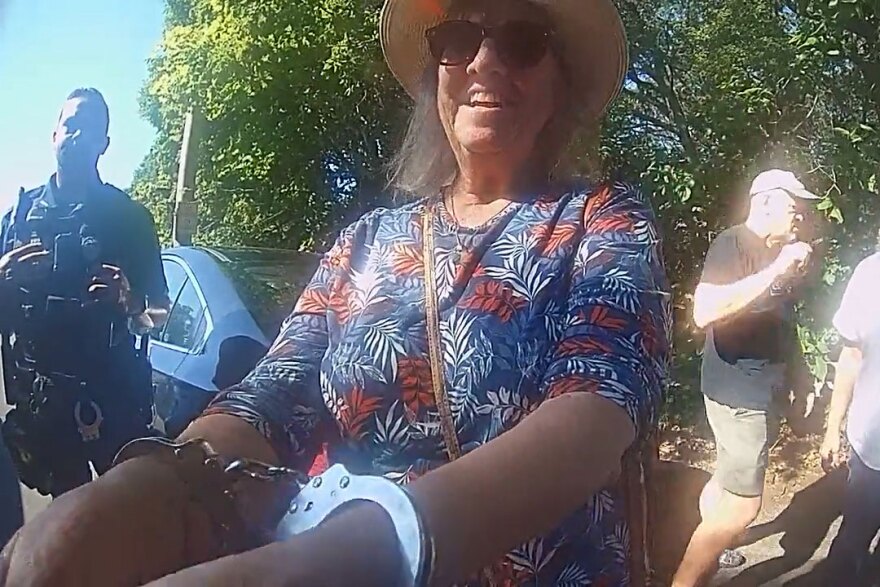Connecticut State Police have released hours of video footage after questions surfaced about whether they improperly stifled free speech by breaking up political demonstrations on highway bridges.
Several protesters have been cited – and in one case, arrested – while speaking out against President Donald Trump’s policies.
State police have said that the demonstrations can be a dangerous distraction for drivers, and that protesters violated a state law that prohibits attaching unauthorized signs to highway bridges.
The Connecticut chapter of the American Civil Liberties Union (ACLU) brought the issue to federal court last month. It alleges police are inconsistently enforcing the law and infringing on individual rights.
The body camera footage offers a detailed picture of the encounters, including the arrest of Hamden resident Katherine Hinds, who organizes a local group that demonstrates in the New Haven area.
In one instance, video from Feb. 14, 2025 shows a state trooper dispersing a demonstration on a highway bridge in Branford. The trooper tells Hinds and two others that they aren’t allowed to display any messaging on the overpass.
“It’s a First Amendment thing. It’s like a billboard,” Hinds responds. She goes on to explain that local police previously cleared them to hold their demonstration.
She and others can be seen taking the signs down from the bridge fence and asking the trooper for clarification of the rules.
@ctpublic Highway bridges are a hotspot for people exercising their First Amendment rights in Connecticut. Protestors can regularly be spotted holding signs and waving to cars below on interstates 95 and 84. But not all of that activity has been welcomed by Connecticut State Police. Authorities say the demonstrations can become a dangerous distraction for drivers. Protestors have been cited – and in one case, arrested – this year while speaking out against President Donald Trump’s policies. Others have stopped protesting out of fear of being charged. Hamden resident Katherine Hinds emerged as a public face of the highway protest movement after being arrested twice this year. Overpass demonstrations are effective because the group can reach hundreds of drivers, including people who might not otherwise be exposed to their message, she said. “You're standing on a bridge and you're seeing both sides of any kind of issue driving underneath you,” Hinds said. “You're not preaching to the choir. You're talking to everyone.” The incidents are now raising questions about whether police improperly stifled free speech. The Connecticut chapter of the American Civil Liberties Union (ACLU) last week filed a lawsuit against the state in federal court. The group argues state police are inconsistently enforcing state laws and infringing on individual rights. To read more, tap the link in our bio. 📝: Maysoon Khan 📸: Ayannah Brown, Tyler Russell 🎥: Connecticut State Police
♬ original sound - CT Public
“This is a Department of Transportation overpass, and they don't allow any type of messaging on their overpasses, especially ones that overlook the highway,” the trooper said.
“Do you know the basis of the law, what it’s about though? Why they don’t allow this?” Hinds later asked.
“Because this is a political neutral area,” the trooper responded.
Videos released by state police show subsequent encounters between Hinds and state police, including her arrest on July 19 during a protest in West Haven.
“How many times you have been told by troopers not to be here, you need a permit, and all of that? How many times?” a state trooper asked Hinds.
“Four,” Hinds responded.
“Four times? So you have been given too many opportunities,” the trooper said.
A few weeks later, on Aug. 8, a trooper showed up to Hinds’ doorstep around 6 a.m. and arrested her under new charges in connection with other highway overpass protests. That footage was not released by state police.
In an arrest warrant, Trooper Joshua J. Jackson wrote that the protests violated DOT regulations, and were a “dangerous distraction to highway traffic” because they caused traffic congestion. Police allege Hinds kept protesting on overpasses despite being warned against doing so.
Hinds was charged with trespassing and breach of peace. In an email, Connecticut State Police said probable cause existed to support each of the arrests.
However, Hinds and her attorneys maintain the arrests were improper, in part because Hinds previously named Jackson, who was involved in her second arrest, in a complaint filed with state police that alleges she was being harassed.
In response to questions from Connecticut Public, a state police spokesperson said police conducted an internal affairs investigation after receiving a complaint from Hinds. The spokesperson said documents related to the investigation, as well as information about the agency’s policies regarding involvement by troopers in cases in which a suspect has filed a complaint against them, must be obtained through a Freedom of Information Act request. The spokesperson said Jackson remains on full duty.
The ACLU is now asking a judge to allow people to protest on highway overpasses without the fear of being prosecuted.
“Streets and sidewalks and public parks are the spot where our First Amendment rights are perhaps most protected,” Dan Barrett, the ACLU of CT’s legal director, said previously. “There have been groups from all over the political spectrum using the overpasses in the last 10 years to voice their views.”





